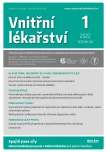-
Medical journals
- Career
Cholesterol measurement and current guidelines
Authors: Vladimír Soška
Authors‘ workplace: Oddělení klinické biochemie, Fakultní nemocnice u sv. Anny v Brně
Published in: Vnitř Lék 2022; 68(1): 54-57
Category: Review Articles
Overview
The concentration of total cholesterol has so far been part of the SCORE tables for estimating the risk of cardiovascular events; in the new SCORE2 tables, it has already been replaced by non-HDL-cholesterol. Total cholesterol continues to serve as a guide for the presence of dyslipoproteinemia and is necessary for the calculation of LDL-cholesterol and non-HDL-cholesterol. The importance of HDL-cholesterol as a separate risk factor is already limited, but it is necessary for the calculation of non-HDL-cholesterol and LDL-cholesterol. LDL-cholesterol remains an essential indicator of risk, it is needed for decision making and control of hypolipidemic therapy. Non HDL-cholesterol can be used as a therapy target instead of LDL-cholesterol. Triglycerides remain necessary for residual risk assessment, for the calculation of LDL-cholesterol and for the diagnosis of certain types of dyslipoproteinemias.
Keywords:
triglycerides – atherosclerotic cardiovascular diseases – HDL‑ cholesterol – LDL‑ cholesterol – non HDL‑ cholesterol – total cholesterol
Sources
1. Mach F, Baigent C, Catapano AL et al. 2019 ESC/EAS Guidelines for the management of dyslipidaemias: lipid modification to reduce cardiovascular risk. Eur Heart J 2019;41 : 111-188.
2. Cuende JI, Cuende N, Calaveras‑Lagartos J. How to calculate vascular age with the SCORE project scales: a new method of cardiovascular risk evaluation. Eur Heart J 2010;31 : 2351 - 2358.
3. Visseren FLJ, Mach F, Smulders YM et al. 2021 ESC Guidelines on cardiovascular disease prevention in clinical practice. Eur Heart J 2021;42 : 3227-3337.
4. Catapano AL, Graham I, De Backer G et al. 2016 ESC/EAS Guidelines for the Management of Dyslipidaemias. Eur Heart J 2016;37 : 2999-3058.
5. Soska V. Secondary dyslipidemias and their treatment. Vnitr Lek 2007;53 : 396-400.
6. Meyers CD, Tremblay K, Amer A et al. Effect of the DGAT1 inhibitor pradigastat on triglyceride and apoB48 levels in patients with familial chylomicronemia syndrome. Lipids Health Dis 2015;14 : 8.
7. Holmes MV, Asselbergs FW, Palmer TM et al. Mendelian randomization of blood lipids for coronary heart disease. Eur Heart J 2015;36 : 539-550.
8. Group HTRC, Bowman L, Hopewell JC et al. Effects of Anacetrapib in Patients with Atherosclerotic Vascular Disease. N Engl J Med 2017;377 : 1217-1227.
9. Nordestgaard BG, Chapman MJ, Humphries SE et al. Familial hypercholesterolaemia is underdiagnosed and undertreated in the general population: guidance for clinicians to prevent coronary heart disease: consensus statement of the European Atherosclerosis Society. Eur Heart J 2013;34 : 3478-3490a.
10. Nordestgaard BG, Langlois MR, Langsted A et al. Quantifying atherogenic lipoproteins for lipid ‑ lowering strategies: Consensus‑based recommendations from EAS and EFLM. Atherosclerosis 2020;294 : 46-61.
11. Friedewald WT, Levy RI, Fredrickson DS. Estimation of the concentration of low‑density lipoprotein cholesterol in plasma, without use of the preparative ultracentrifuge. Clin Chem 1972;18 : 499-502.
12. Martin SS, Giugliano RP, Murphy SA et al. Comparison of Low‑Density Lipoprotein Cholesterol Assessment by Martin/Hopkins Estimation, Friedewald Estimation, and Preparative Ultracentrifugation: Insights From the FOURIER Trial. JAMA Cardiol 2018;3 : 749-753.
13. Vaverkova H, Soska V, Rosolova H et al. [Czech Atherosclerosis Society Guidelines for the diagnosis and treatment of dyslipidemias in adults]. Vnitr Lek 2007;53 : 181-187,189,191 - 183 passim.
Labels
Diabetology Endocrinology Internal medicine
Article was published inInternal Medicine

2022 Issue 1-
All articles in this issue
- Ohlédnutí za XXVIII. kongresem ČIS ČLS JEP
- How to run an internal medicine department: head physician – trainer
- Operating a modern performance-oriented internal medicine outpatient unit
- A cirrhotic patient in an internal medicine ward
- Direct costs in patients with nonvalvular atrial fibrillation newly indicated to apixaban: a retrospective‑ prospective single‑ arm cohort study
- Recommendations of the European Society of Hypertension for measuring blood pressure in the medical office and outside the medical facility
- Multicentric Castleman’s disease. Symptoms, diagnostics and therapy
- Cholesterol measurement and current guidelines
- Differential diagnosis of pituitary enlargement
- Advances of the contemporary treatment of hypertension and hypercholesterolemia by a new fixed combination
- Levotyroxin
- Internal Medicine
- Journal archive
- Current issue
- Online only
- About the journal
Most read in this issue- A cirrhotic patient in an internal medicine ward
- Cholesterol measurement and current guidelines
- Differential diagnosis of pituitary enlargement
- Levotyroxin
Login#ADS_BOTTOM_SCRIPTS#Forgotten passwordEnter the email address that you registered with. We will send you instructions on how to set a new password.
- Career

